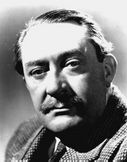Gilbert Harding
(→Trivia) |
|||
| Line 33: | Line 33: | ||
He had to be sacked by the [[Twenty Questions]] producer, [[Ian Messiter]], after he was drunk on the show. | He had to be sacked by the [[Twenty Questions]] producer, [[Ian Messiter]], after he was drunk on the show. | ||
| - | Suspected as a homosexual but he never "came out", particularly as such a thing was illegal in those days. | + | Suspected as a homosexual, and hinted at it in his autobiography with a mention of "other reasons [apart from then being in his mid-40s] that, so far as I can see, will keep me from marrying", but he never "came out", particularly as such a thing was illegal in those days. |
| - | + | ||
| - | + | ||
[[Category:People|Harding, Gilbert]] | [[Category:People|Harding, Gilbert]] | ||
Revision as of 18:40, 2 July 2013
Shows
Ask Your Dad (pilot)
One Minute Please (regular guest)
Question-Masters Club (panellist)
What's My Line? (host for one show only, then panellist)
Biography
Grumpy journalist and occasional actor who was both loved and loathed in equal measure in the same way that, say, Anne Robinson is today. Through appearances on panel games such as What's My Line?, millions of viewers tuned in to see his outbursts as he was frequently overtly rude to hosts, guests, panellists and even his producers.
In 1960, he gave an emotional interview on Face to Face, where - in tears - he openly declared how much he hated being a TV celebrity for no good reason. He died of a heart attack two months later.
Trivia
His first job with the BBC was working in the BBC Monitoring service (which still exists) during WW2 - the service was set up to monitor foreign radio broadcasts for anything of interest, and Harding's job was to prepare a daily digest for the benefit of the War Office.
He had to be sacked by the Twenty Questions producer, Ian Messiter, after he was drunk on the show.
Suspected as a homosexual, and hinted at it in his autobiography with a mention of "other reasons [apart from then being in his mid-40s] that, so far as I can see, will keep me from marrying", but he never "came out", particularly as such a thing was illegal in those days.


